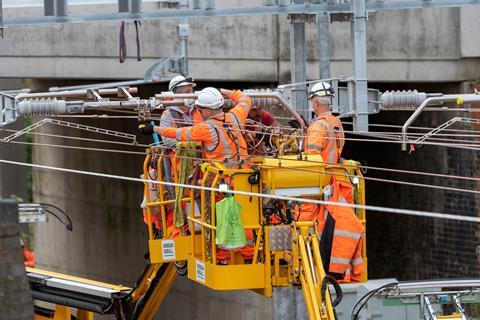Annual report also recommends multi-year financial settlements for mayors and councils to ensure spending certainty
The National Infrastructure Commission’s annual review has warned that a failure to go further and faster over the next five years on plans for infrastructure delivery could constrain economic growth and threaten climate targets
NIC chair John Amritt said: “A window remains to ensure that practical delivery plans are in place, backed up by the necessary public and private funding, to help achieve economic and environmental goals that will improve life for British households.”
The report recommended that by the next spending review, the government should agree multi-year financial settlements for mayoral combined authorities and continue providing these settlements for new combined authorities.

The NIC also said that county councils and unitary authorities responsible for strategic transport planning should get five-year transport budgets by the end of next year.
Armitt added: “Transport for London still lacks a sustainable five year devolved transport settlement. It needs one to plan for the future, while other authorities responsible for transport beyond the mayoral combined authorities should also receive five year settlements.”
The review also recommended that government will need to provide long-term capital funding of £22bn for major transport schemes from 2028 to 2045 with the focus on Leeds, Bristol, Birmingham and Manchester.
Armitt said: “There is always the question of do I try and please everybody and do I spread the jam across multiple towns and cities or do I try and focus where I think the biggest opportunity in the in a sense the biggest need is.
“We allocated two thirds of this money to those four critical cities and then allocated the rest of the funds on a more accessed basis of needs to other towns and cities.”
And he added: “The thing that I would really emphasise is for consistent and long-term opportunity for towns and cities by knowing that on a regular basis, there will be a settlement from government that helps them to plan.”
>>See also: Infrastructure and speeding up the planning system
>>See also: The race is on… Countdown to the general election part three: Infrastructure and creating communities
The NIC said the government’s Network North plan, a £36bn initiative introduced last autumn in the wake of the decision to cancel the second phase of HS2, requires greater clarity surrounding what schemes it will introduce, its cost as well as when it will be delivered.
It added that “greater specificity is needed regarding the scope, cost, benefits and schedule for the schemes individually and as a package”.
In response to the review, Jordan Cummins, the UK competitiveness director of the CBI, said: “Investment in physical and digital infrastructure, as well as improving connectivity within and between our key economic centres, is a critical enabler of economic activity.”
And Henri Murrison, chief executive at the Northern Powerhouse Partnership, welcomed the need for specifics and said: “The current plan to do nothing, as set out in Network North programme, is not viable as it restricts growth between both Manchester and Leeds with Birmingham.”
UK lacks skills to build infrastructure, MPs warn
The UK lacks the necessary skills and capacity to deliver ambitious plans for major infrastructure over the next five years, a group of watchdog MPs has said.
The Public Accounts Committee (PAC) warned skills shortages in technical and engineering disciplines will worsen as gaps in the UK’s workforce are compounded by competition from major global development projects.

Project management and design are also areas of concern, and skilled professionals in senior positions in particular.
In March last year, the government Major Projects Portfolio included 244 projects with an estimated total whole-life cost of £805bn. But the PAC said government departments are failing to devote the time and effort needed to ensure they maximise the value that comes from projects.
PAC chair Meg Hillier said: “Over the coming years, Government spending on major infrastructure projects is set to rise to unprecedented levels. Such projects present unique and novel challenges which Government must navigate if it is to secure value for public money. Without a robust market for essential skills in place, these are challenges the UK will fail to meet, as shortages push costs up in a globally competitive environment.
“All too often we see projects and programmes that are poorly managed and delivered late and over budget. The failure to ensure projects have robust impact evaluation plans in place is symptomatic of the short-term mentality dominating these processes. The Government must encourage cross-departmental learning if we are to avoid repeating past mistakes.”


























No comments yet